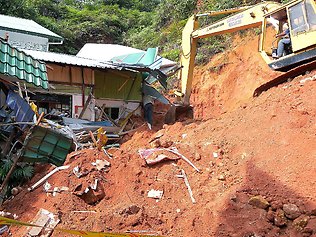Natural disasters are an inevitability and events with which we will always have to co-exist. However, we have developed mechanisms to mitigate the consequences of these disasters and save lives. Unfortunately for the children in the devastating orphanage landslide, critical lapses in protection mechanisms and government oversight clouded the imminent warnings of disaster.
Natural disasters are tragic and awe-inspiring, leaving victims and witnesses reflecting on what little control they have over Mother Nature. We have come to accept these events as inevitabilities, with each individual hoping he or she will not have the pitiful fate of crossing nature’s vicious path.
However, let us not confuse our inability to control natural disasters with our capability to predict and minimize their consequences. This is an area in which we have the resources and technology, and the foresight to evacuate communities before disaster strikes.
Unfortunately, for the children killed and injured during the landslide that engulfed the Hidayah Madrasah Al-Taqwa orphanage, caretakers and authorities failed to utilize these invaluable resources. Stemming from analysis of the soil in the disaster area, engineers from the Public Works Department (PWD) concluded that tragedy could have been averted had the owner and staff heeded the looming signs of uprooting trees and heavy rain. Engineers also noted that the orphanage was built in a precarious position adjacent to a steep hillside, leaving it vulnerable from its inception.

It is comforting to halt the conversation at this juncture, and conclude that the calamity is due wholly to the irresponsibility and mismanagement of the owner of the orphanage. And while there is validity in this judgment, the case elucidates irresponsibility and mismanagement arising from a much larger entity.
The Department of Social Welfare, the agency responsible for managing these homes, failed to locate this active orphanage and either provide registration or shut it down. Without the department’s oversight and monitoring, the orphanage was built on feeble soil and in shoddy conditions, chemistry for disaster in this rainy and hilly terrain.
Every orphanage or care center must be registered with the Department of Social Welfare. This ensures, amongst other things, that each home meets the minimum standards for safety and maintenance, staff training and qualification, and treatment and care of its residents. These requirements, outlined in the Care Centres Act 1993, are to be monitored by the Director General of Welfare, and frequently evaluated for adequacy.
These accountability mechanisms for registered homes still have their shortcomings, and can benefit from institutional strengthening of staff-training requirement standards, as well as formal mandatory inspection intervals. Nevertheless, the safeguards provide critical protections for children and the caretakers.
Thus, the problem lies not in the registered homes, but in the unregistered homes, like the one that collapsed from the landslide. Without registration, there is no mechanism for inspection or monitoring by department officials, and consequently nominal protection for its residents. There is no oversight regarding the safety of the premises, overcapacity of the home, or the treatment and care administered by staff.
Even more troubling is the government’s inability to locate these unregistered homes. Currently, there is no accurate figure on their number or how many children for which they provide care. The homes fly under the radar, leaving children vulnerable to misconduct, abuse, and disasters such as the landslide.
Voice of the Children (VoC), a children’s advocacy organization for which I volunteer, has urged the Department of Social Welfare to address this swelling issue before other children bear the brunt of mismanagement. VoC recommended the Department to consider instituting an amnesty period; during which unregistered homes can register without penalty or risk of being shut down. This would surely be in the best interests of the homes, as they would subsequently receive institutional support from trained welfare officers and be recognized as credible care centers. Similarly, the Department would finally be able to identify unregistered homes and thus greatly minimize the possibility of abuse and tragedy. In the aftermath of this tragedy, the Selangor government has already embarked on a similar initiative by establishing one-stop centers to coordinate the issuance of registration licenses.
The time for bickering about bureaucratic procedures and registration formalities is finished. We must now focus on one thing and one thing only: how to best protect the children in these care centres. Because while Mother nature cannot discern between registered and unregistered homes, we can, and the government must take all precautions to protect the children in these homes from her destructive path.
For more details on Voice of the Children and its programs, please visit http://voc.org.my.
Liam Hanlon hails from the inner city streets of San Francisco, where he served as a full-time Mexican-food aficionado, part-time social activist, and even smaller-time student. After attending UCLA for his bachelor’s degree in Political Science, Liam moved to Geneva, Switzerland for a year, working for the international legal-rights NGO International Bridges to Justice. During this stint, he co-coordinated the 2010 Asia Justice Makers Competition, which sourced and funded local legal-rights initiatives throughout Asia. After a two month hiatus scouring the lands of Southeast Asia with his rucksack, Liam moved to KL in October 2010 to begin documenting the work of one of the Justice Makers Fellowship recipients, Dato’ Yasmeen Shariff, for her work with juvenile justice. He has since shifted his time to interning for another NGO Voice of Children, as well as transforming into a LoyarBurok minion.
